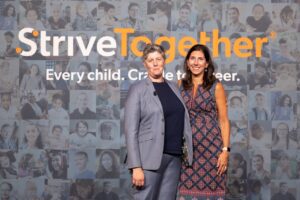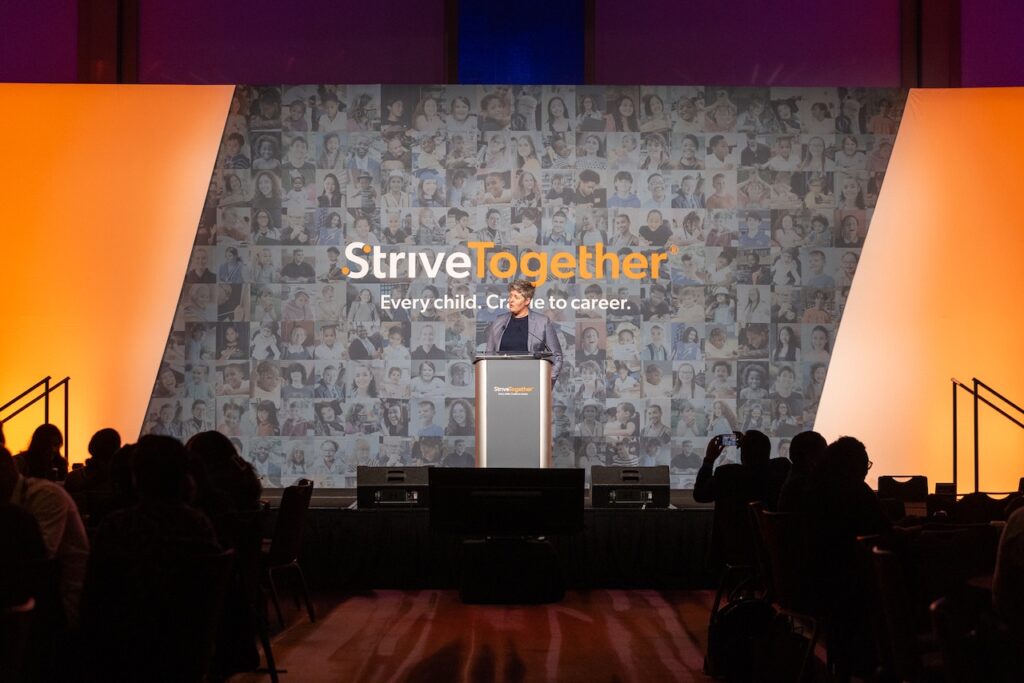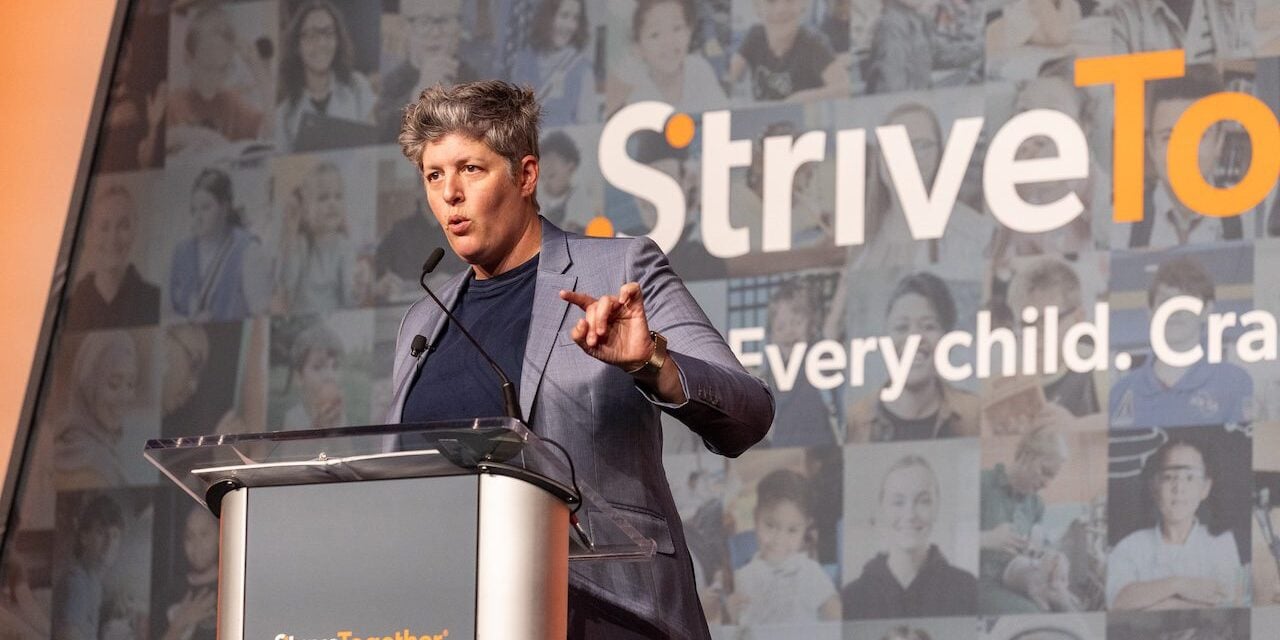The Cradle to Career Network has always been about opportunity, ensuring every young person has the chance to thrive. Across the country, communities are turning that vision into reality. They’re improving outcomes like early grade reading and high school graduation rates, building stronger pathways to postsecondary success and shaping policy to better serve children and families.
This year’s Cradle to Career Network Convening was a chance to celebrate those successes and the thousands of futures they represent. It was also a time to reflect on what it will take to sustain and grow this progress in a moment when so many families still feel left out and left behind. 
That reflection came into sharp focus in the closing plenary with Sally Kohn, a writer, activist and commentator. Today she coaches leaders, nonprofits and community groups in telling their story with authenticity and courage. Over the past several years, Sally has interviewed pro-democracy leaders across the globe, bringing back hard truths and hopeful lessons about the state of democracy worldwide. Sally invited us to see our own work in that bigger context. She reminded us that the progress we celebrate across the Cradle to Career Network doesn’t just change outcomes for children and families. It strengthens the very foundation of our democracy.
Sally described the path forward as Democracy 3.0 — the idea that our future grows stronger when people can see and feel opportunity in their daily lives. When families find stability, when children are ready for school, when young people can imagine a future, trust in democracy increases. That is the work happening across the Cradle to Career Network.
A Critical Moment and a Call for Connection
Sally began by naming the truth many of us feel every day: we are living through a precarious moment as a nation and as a world. Inequality and suffering run deep. Too many people feel excluded — economically, culturally and educationally.
Her answer to this crisis was not division. She reminded us that violence is never the solution, nor is shutting out those we disagree with. Instead, she offered something both simple and radical: connection. Connection through ideas, empathy and dialogue.
Across the Cradle to Career Network, place-based partnerships bring connection to life. They connect across sectors and silos — education, housing, health care, business and more — to remove barriers and expand opportunity. By linking families to resources and opportunities to a broader sense of possibility, these partnerships show what’s possible when people work together. Every time a coalition comes together around data, strategy and action, they model the democratic renewal Sally described.
Sally shared her lessons from interviewing pro-democracy leaders worldwide. Their conclusion was striking: authoritarianism gains leverage in the gaps where democracy leaves people behind. People lose hope in democracy when it does not deliver meaningful opportunity. Polling data reinforces this: when families believe the economy is failing or that children will be worse off in the future, they are far more likely to doubt democracy itself.
The conclusion is clear: if democracy does not deliver opportunity, people begin to look elsewhere. That reality sets the stage for why our work matters so profoundly.
Democracy 3.0 and the Work of the Network
To illustrate the path forward, Sally walked us through the evolution of democracy.
- Democracy 1.0 was the idea of self-government where the power belonged to the people, not kings or elites. But in practice, this vision excluded many.
- Democracy 2.0 expanded participation through abolition, women’s suffrage, civil rights and the Voting Rights Act. Imperfect and unfinished, this phase showed that inclusion matters because participation changes outcomes.
- Democracy 3.0, Sally argued, must focus on why. If everyone has a voice, why do we still see such unequal outcomes? Why is wealth concentrated in the hands of a few, while millions of families struggle?
She noted that today, the top 0.1% of Americans hold 22% of the nation’s wealth, compared to less than 2% in 1989. Globally, 1% of people hold more than the bottom 90% combined. These disparities show the reality of broken systems, where opportunity is uneven and unfair. When those systems fail to deliver, trust in democracy weakens.
Researchers at the Centre for the Future of Democracy at the University of Cambridge have found that in developed democracies, a major contributor to youth discontent is economic exclusion. Higher levels of youth unemployment and wealth gaps are associated with rising dissatisfaction, creating a growing gap between how young people and older generations view democracy. This widening divide is a warning sign for all of us: democracy cannot endure if young people lose faith that it will deliver for them.
For Sally, Democracy 3.0 means redefining the purpose of democracy. It is about the power to shape one’s life, pursue happiness and achieve dreams.
She put it plainly: “In a healthy democracy, economic opportunity should be distributed fairly and evenly. And in a healthy democracy, economic outcomes should be determined by skill and effort — not race or gender or geography or the relative wealth or poverty of the family into which one was born.”
This vision mirrors what the Cradle to Career Network is pursuing. Our work demonstrates that expanding opportunity and strengthening democracy are inseparable. Sally highlighted Network examples that bring this truth to life:
- In Southeastern Kentucky, the Appalachian Cradle to Career Partnership has paired data with civic connection to improve kindergarten readiness and high school graduation.
- In San Francisco, Mission Promise Neighborhood is creating the infrastructure families need — schools, housing, health care — to ensure stability and participation in civic life.
- In Baltimore, Baltimore’s Promise is opening bold new employment pathways so young adults can achieve economic self-sufficiency.
- And in Wisconsin, four Network members worked together to secure a $380 million state investment in early childhood and literacy.
These successes show programmatic gains and advocacy victories. They prove that when communities come together to solve problems, they strengthen both opportunity and democracy itself.

A Promise Renewed
Sally reminded us that the founding promise of this nation — life, liberty and the pursuit of happiness — has always been aspirational. Democracy 1.0 gave life to the idea. Democracy 2.0 extended liberty, though imperfectly. Democracy 3.0 requires us to make the pursuit of happiness real.
Her charge was clear: “We have to reimagine democracy itself, reform the goal of democracy with the idea that a functioning democracy leads to economic mobility and opportunity.”
That is the work of StriveTogether and the Cradle to Career Network. Each system we change, each barrier we remove, each policy we win is a step toward democracy that delivers on its promise.
As I listened to Sally, I felt both urgency and hope. Urgency, because opportunity gaps and division are deepening, and democracy itself is under strain. Hope, because this Network is already showing what the future can look like. Every data point represents a child with a better chance. Every coalition represents people who chose collaboration over division. Every policy win represents trust restored.
Democracy is measured in everyday realities like a family’s ability to keep a roof over head, a child’s readiness to learn, a young person’s confidence in tomorrow. The Network proves that advancing opportunity is also an act of renewing democracy.
We defend democracy by improving it. We fix democracy by making it deliver on its promise. That’s what this Network is building: systems where opportunity is distributed, where effort and skill can truly shape outcomes and where every young person has the chance to thrive.
As we closed the convening, I held onto Sally’s reminder that democracy is about more than a vote. It is about agency and influence in how we are governed and in how we live. Together, we are reimagining democracy by rewriting opportunity, one system, one community, one future at a time.






